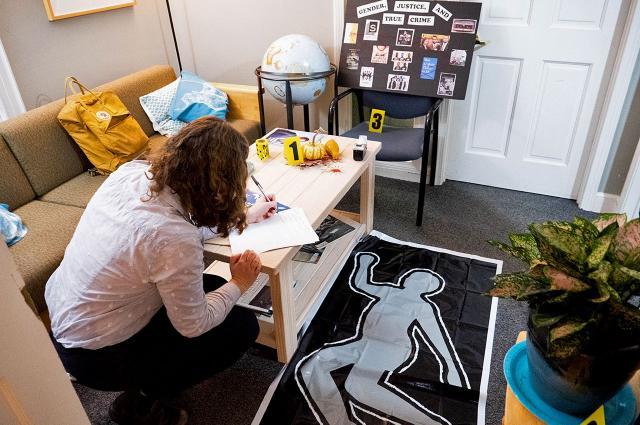Gender, Justice, and True Crime

Francesca Rubinson, Class of 2020, prepares a mock crime scene for last fall's "ExCollege Experience" event. Photograph by Siddhant Talwar
In Gender, Justice & True Crime, peer teachers Francesca Rubinson and Elisa Sturkie address the alarming realities of crime and how we as a society can strive for justice. For the two seniors, recognizing the role that gender and race play in crime today became crucial. The intersection of identities that contribute to alarming criminal statistics demanded investigation, and Francesca and Elisa's ExCollege course aims to do just that.
Between both of them, Francesca and Elisa major in an outstanding combination of five departments: English, Political Science, Religion, Spanish, and Peace and Justice Studies. They studied abroad together in Chile, where they worked for a non-profit serving indigenous women. For Francesca, this experience influenced her decision to teach Gender, Justice & True Crime, as she saw first-hand the discrimination and criminalization of indigenous women in the Chilean criminal justice system. She explained, "That experience made me think critically about my true crime consumption and the intersections of gender, race and ethnicity, criminal justice, and violent crime." As for Elisa, her desire to teach the topic came from her extensive experience in critically examining gender in her Peace and Justice Studies coursework. Elisa's interest in true crime developed later and complemented her passion for gender and justice.
The course is divided into three parts: understanding who the missing and murdered are, investigating who the perpetrators are, and considering how to seek justice. By beginning the class by acknowledging that many victims of crime and violence are members of marginalized communities – rather than predominantly straight white women as media often portrays – the narrative becomes more complete and better represents the real world.
In addition to breaking down the demographics of victims and how their identities are targeted, students have the opportunity to explore systems of justice and how such systems make victims from marginalized communities more vulnerable. Students discuss why true crime media has so many female fans, why some cases are investigated, and some aren’t, and how the media covers the criminals and victims they do.
The class also creates a space to consider the serious and sensitive content of true crime through storytelling, giving participants a chance to discuss broadly the ethics and motives of true crime media in a modern-day world. Instead of treating the genre like a source of entertainment, as it is so often consumed, students take an in-depth look at victims with a range of identities and the severity of the offenses committed.
Francesca taught another ExCollege course – Women in Global Politics – as an Explorations seminar in the fall semester, and the experience motivated her to teach another. For Elisa, teaching through the ExCollege has always been a dream. "I think the ExCollege is one of the most unique and exciting things Tufts has going for it."
Francesca and Elisa hope that the course uncovers the deeply rooted identity aspects of true crime, and how this influences whose stories are told. The class highlights narratives from vulnerable communities that are frequently hidden. Though complex and often devastating, true crime is navigated through a social justice lens with the guidance of two exceptional peer teachers.
About the Author
Grace Prendergast is a first-year student from Evanston, Illinois studying Biology. She enjoys reading, listening to music, and hanging out with friends in her free time.